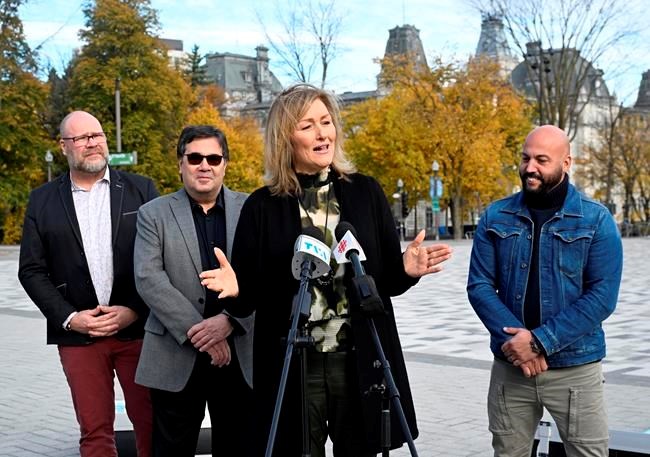MONTREAL — Unions representing more than 400,000 public sector workers launched the first of three consecutive strike days on Tuesday, resulting in school closures and delayed surgeries — while tens of thousands of other workers are set to walk out later this week.
Forming a "common front," four major unions are striking together, their leaders rebuking the government for offers they say fail to protect the purchasing power of their members, who include teachers and school support staff, as well as health workers such as orderlies and technicians.
More strikes are coming: the union representing 80,000 nurses, respiratory therapists and other health professionals will be striking on Thursday and Friday, and a teachers union with 65,000 members will be on strike indefinitely as of Thursday.
"We want to negotiate, we want better working conditions, it's been difficult, we've been at the table for the past year and nothing really has moved," Josée Fréchette, vice-president with health-care union Alliance du personnel professionnel et technique de la santé et des services sociaux, told reporters in Montreal.
Adding to the tension is a recent decision by the Quebec government to spend millions of taxpayer dollars to bring the Los Angeles Kings NHL team to Quebec City next year for two pre-season games.
"Last week, they were telling us there wasn't enough money for the public sector, for our workers, then the week after they say they're putting in $7 million for the Kings to come," Fréchette said.
Outside Bancroft Elementary School, in central Montreal, a small group of support staff picketed Tuesday, encouraged by frequent honks of support from passing motorists. Vanessa Giancioppi, a daycare educator at the school, said the strike isn't just about salaries: workers like her need more resources for such things as the increasing number of special needs students.
"It's not even a matter of, 'Oh, we want to be comfortable and have lovely lives.' We know you don't get into this profession for that reason," she said. "But when we can barely afford to work … it's a little insulting, that we're just not being taken seriously."
The unions have rejected Quebec's latest contract offer — a 10.3-per-cent salary increase over five years and a one-time payment of $1,000 to each worker. The unions, who have not made a counter-offer, have been asking for a three-year contract with annual increases tied to the inflation rate.
Cassandre Houdin, a laboratory technician at the Centre hospitalier de l'Université de Montréal, a large downtown hospital, said the province's offer isn't enough to match the rising cost of living. After the members of the legislature voted earlier this year to give themselves a 30-per-cent raise and offered provincial police officers a 21-per-cent salary increase — which police union members rejected — the offer for health-care workers is "indecent," she added.
In Quebec City, Treasury Board Chair Sonia LeBel, who is leading the negotiations, suggested that the government was open to modifying its offer but said a main sticking point is the "organization of work." The province, she said, wants to pay workers more for accepting less desirable shifts, such as on nights and weekends.
The government's goal, she said, "is for the day after the signing of the agreement, to see an impact not only in the daily lives of our employees … but also to have improved services for citizens."
Flanked by the ministers of education and health, LeBel said the unions are focusing on the salaries to make a case for a strike. "But when we talk to nurses, when we talk to teachers, they're talking about their workload."
However, she said the government won't be able to, in the short term, meet a union demand to reduce the ratio of students to teachers in the province's schools because of labour shortages.
Health Minister Christian Dubé said the strikes are impacting the health network, especially surgeries and vaccination schedules.
"I'm not able to vaccinate as much as we would like to do because we're missing nurses … there are many impacts, many impacts."
Meanwhile, Doug Bentley, a father of two living west of Montreal, said in a recent interview there will be some juggling with one child in elementary school and another in high school, but he said there's a lot at stake for teachers on the picket line, who are fighting for more pay and classroom support aides.
"It's going to be challenging for all parents because having this three days in the middle of the week is definitely not going to be easy for parents," Bentley said. "But you know, our family understands and our circle of friends understand why they're doing it … there's so much that goes into the conditions that aren't being met."
And while he feels solidarity with teachers, he said he hopes they aren't on strike for long, especially as kids try to catch up from class time lost during the COVID-19 pandemic.
"The fastest way to get them back (in the classroom) is the best solution," Bentley said. "And that's up to the government negotiators and the unions."
This report by The Canadian Press was first published Nov. 21, 2023.
— With files from Caroline Plante in Quebec City.
Sidhartha Banerjee and Jacob Serebrin, The Canadian Press



